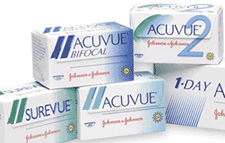For people with vision problems, contact lenses still remain an effective corrective tool. In the last few years, technological innovations have produced more options for treating each kind of these vision conditions namely short sightedness, farsightedness, astigmatism or presbyopia.
People who are short sighted (myopia) can see clearly up close but not at a distance. Concave or “minus” lenses are prescribed by eye care practitioners. These lenses redirect the light rays so that they are properly focused on the retina. A number of Acuvue Brand Contact Lenses are available to correct myopia and restore sharp, clear distant vision.

Farsightedness or hyperopia is a vision defect wherein a person can see better at a distance than close up and at times experience difficulty reading up close. Farsightedness can be successfully treated with convex or “plus” lenses prescription available with a wide array of Acuvue Brand Contact Lenses options.
Astigmatism is a vision condition characterized by an oval shape cornea which prevents light from focusing properly on the retina resulting in distorted reflection. People with astigmatism typically have blurred vision and experience headaches, eyestrain or eye fatigue. Before, people with astigmatism were limited to wearing eyeglasses only. But today’s toric contact lenses like Acuvue Brand Toric Lenses can provide enhanced visual clarity.
Around the age of 40, people lose their ability to shift focus between near and far objects. This natural process caused by a progressive loss in the flexibility of the lens of the eye is called presbyopia. Reading glasses used to be the only corrective tool. Today, this condition is also corrected with bifocal contact lenses, say, the Acuvue Brand Bifocal Contact Lenses.
Eye Exams
To ensure good and healthy vision, have an eye exam regularly. Eye exams can reveal vision problems early on and fast remedies can be done to correct these problems before they get any worse. Eye exams can also help provide evidences of other serious medical conditions.
Before an eye exam, your eye care professional will inquire about your health history, instances of eye problems in the past, your work and lifestyle. A vision test is then given to determine if any vision problem exists and if necessary a prescription is given to correct any vision problem. Subsequently, your eye doctor will set a regular schedule for future eye exams adapted to your personal situation.
All children should also have eye check-ups at or before their fourth birthday. Children with family histories of misaligned eyes or any serious eye problems should have eye exams before they reach the age of three. Vision problems are easily treated during the development stage of a child’s visual system. Early detection can help ensure good vision.
Eye Nutrition
Nutrition plays an important role in eye health. Good nutrition is vital for good vision. To have healthy eyes, eat a well-balanced diet consisting of lots of vegetables and fruits. Take supplements like anti-oxidant vitamins. As one gets older, bodily changes also affect the eyes. Oxygen is indispensable but it produces “free radicals”. These “free radicals” prevent cells from regenerating, damage the retina and affect the lens, a clear tissue found behind the iris. Vitamins and mineral supplements can help the eyes thwart the ill effects of “free radicals”. Smoking is also hazardous for the eyes as it harms the tissues of the eyes and also increases “free radicals”. Prolonged exposure to sunlight can cause eye diseases. Simply put, healthy eyes equal good vision.